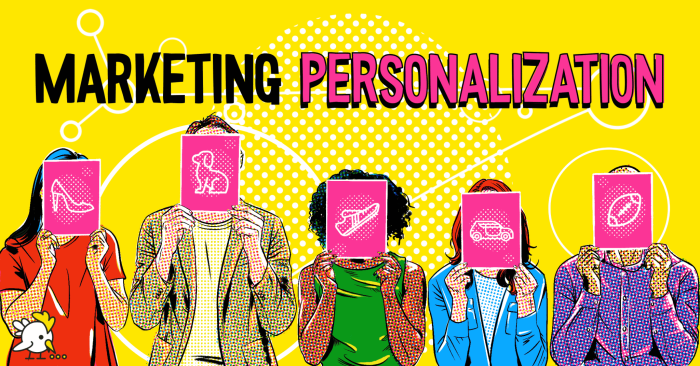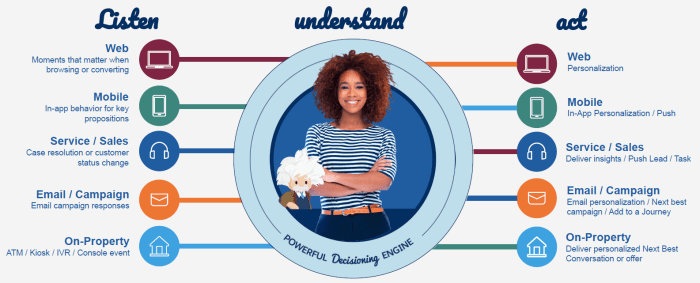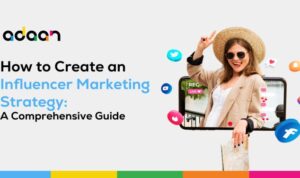Kicking off with Personalization in Marketing, this topic dives deep into creating tailored strategies that resonate with customers on a personal level. From customized emails to AI-driven recommendations, let’s explore the world of personalized marketing.
Definition of Personalization in Marketing

Personalization in marketing refers to the practice of tailoring marketing messages, products, or services to individual customers based on their preferences, behaviors, or characteristics. It involves using data and technology to create customized experiences that resonate with each customer on a personal level.
Examples of Personalized Marketing Strategies
- Amazon’s product recommendations based on past purchases and browsing history
- Netflix’s personalized movie and TV show suggestions based on viewing habits
- Sephora’s customized beauty product recommendations based on skin type and preferences
The Importance of Personalization in Modern Marketing
Personalization is crucial in modern marketing because it helps businesses build stronger relationships with customers, increase customer loyalty, and drive higher engagement and conversions. By delivering relevant and personalized experiences, businesses can stand out in a crowded marketplace and create lasting connections with their target audience.
Benefits of Personalization in Marketing

Personalization in marketing offers a wide range of benefits that can significantly impact the success of a campaign. By tailoring content and messaging to individual preferences and behaviors, companies can create more meaningful interactions with their target audience, ultimately leading to higher levels of engagement and conversion rates.
Improved Customer Engagement
Personalization allows brands to create more relevant and targeted content for their audience. By understanding the unique needs and preferences of each customer, companies can deliver tailored messages that resonate on a personal level. This increased relevance leads to higher levels of engagement, as customers are more likely to pay attention to and interact with content that speaks directly to their interests.
Increased Conversion Rates
When customers receive personalized messages that are tailored to their specific needs and interests, they are more likely to take action. Whether it’s making a purchase, signing up for a newsletter, or engaging with content, personalized marketing campaigns have been shown to drive higher conversion rates. By delivering the right message to the right person at the right time, companies can significantly increase the likelihood of converting leads into customers.
Techniques and Tools for Personalization
Personalization in marketing campaigns can be achieved through a variety of techniques and tools that help businesses tailor their messaging to individual customers. By utilizing these strategies effectively, companies can create more engaging and relevant experiences for their target audience.
Dynamic Content
Dynamic content is a technique that involves changing the content of a marketing message based on individual user data. This can include personalized product recommendations, tailored offers, or customized messaging that resonates with the recipient’s preferences. By dynamically adjusting content, companies can increase the likelihood of conversion and engagement.
AI-Driven Recommendations
Artificial intelligence (AI) technologies can analyze customer data to provide personalized recommendations for products or services. By leveraging machine learning algorithms, businesses can offer relevant suggestions to customers based on their browsing history, purchase behavior, or demographic information. This approach enhances the customer experience and drives sales by promoting items that are likely to appeal to each individual.
Segmentation
Segmentation involves dividing customers into distinct groups based on shared characteristics or behaviors. By creating segments such as age, location, purchase history, or interests, companies can tailor their marketing campaigns to each group’s specific needs and preferences. This targeted approach allows businesses to deliver more personalized content that resonates with different segments of their audience.
Popular Tools and Technologies
Various tools and technologies are available to help businesses implement personalization in their marketing efforts. Customer relationship management (CRM) systems, email marketing platforms, and marketing automation software can all support personalized messaging and customer segmentation. Additionally, data analytics tools and AI-powered solutions can provide valuable insights for crafting personalized campaigns that drive engagement and conversions.
Personalization in Different Marketing Channels
Personalization plays a crucial role in different marketing channels, allowing businesses to connect with their target audience on a more individual level. Let’s explore how personalization can be applied in email marketing, strategies for implementing personalization on websites, and the role of personalization in social media marketing.
Personalization in Email Marketing
Email marketing is a powerful tool for reaching customers directly, and personalization can significantly enhance its effectiveness. Strategies for implementing personalization in email marketing include segmenting your email list based on demographics, past purchases, or behavior, using the recipient’s name in the subject line or body of the email, and sending personalized product recommendations based on previous interactions.
Implementing Personalization on Websites
Personalizing the user experience on your website can lead to higher conversion rates and increased customer satisfaction. Strategies for implementing personalization on websites include using cookies to track user behavior and provide personalized recommendations, creating dynamic content based on user preferences, and implementing AI-driven tools to deliver personalized experiences in real-time.
Role of Personalization in Social Media Marketing
Social media platforms offer a unique opportunity for businesses to engage with their audience in a more personalized way. Personalization in social media marketing involves tailoring your content to the interests and preferences of your followers, using targeted advertising to reach specific demographics, and engaging with customers through personalized messages and responses.
Data Privacy and Personalization
Data privacy is a major concern in today’s digital age, especially when it comes to implementing personalized marketing strategies. Customers are becoming more aware of how their data is being collected and used, leading to a growing need for transparency and trust in businesses.
Strategies for Maintaining Customer Trust
- Obtain explicit consent: Always ask for permission before collecting any personal data from customers. Clearly explain how the data will be used and allow customers to opt out if they choose.
- Secure data storage: Implement robust security measures to protect customer data from breaches or unauthorized access. Assure customers that their information is safe with your brand.
- Be transparent: Clearly communicate your data collection practices and privacy policies to customers. Provide easy access to information on how their data is being used and give them control over their preferences.
Examples of Brands Balancing Personalization and Data Privacy
- Apple: Apple is known for its strong stance on privacy and data protection. The company emphasizes user control over data sharing and uses anonymized data for personalization.
- Amazon: Amazon utilizes customer data to provide personalized product recommendations while maintaining a transparent approach to data collection and use.
- Netflix: Netflix uses data to personalize content recommendations but ensures that sensitive information is kept secure and only used for enhancing the user experience.
Future Trends in Personalization
Personalization in marketing is constantly evolving, driven by advancements in technology and changing consumer behaviors. Looking ahead, we can predict several key trends that will shape the future of personalized marketing strategies.
Hyper-Personalization through AI
With the rise of artificial intelligence (AI) and machine learning, marketers will be able to delve even deeper into personalization. AI algorithms can analyze vast amounts of data to create highly tailored and individualized experiences for customers. This hyper-personalization will allow brands to anticipate customer needs and preferences with incredible accuracy.
Voice and Visual Search Integration
As voice search and visual search technologies continue to improve, they will play a significant role in personalized marketing. Brands will need to optimize their content for voice and visual search, providing tailored results based on individual queries. This shift will require marketers to rethink their strategies and content creation processes to align with these emerging search trends.
Augmented Reality (AR) and Virtual Reality (VR) Experiences
AR and VR technologies offer immersive and interactive experiences that can be personalized to each user. Marketers can leverage these technologies to create engaging and personalized campaigns that allow customers to interact with products in virtual environments. This level of personalization not only enhances the customer experience but also helps drive brand engagement and loyalty.
Data Privacy and Ethical Personalization, Personalization in Marketing
As personalization becomes more sophisticated, concerns around data privacy and ethical use of customer data will continue to be in the spotlight. Brands will need to prioritize transparency and consent when collecting and utilizing customer information for personalized marketing. Striking the right balance between personalization and privacy will be crucial for building trust with consumers in the future.





